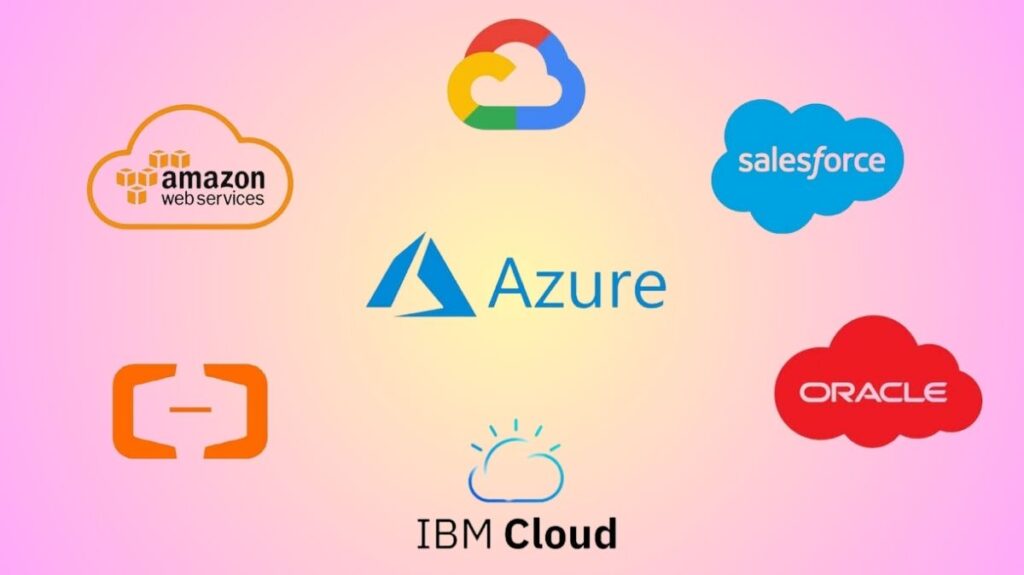A thorough evaluation of cloud platforms to assist you in determining which one is best for your company. Take a look now!
Cloud computing service providers list
By substituting accessible services provided via the Internet for conventional hard drive storage, cloud computing has completely changed IT solutions. A variety of solutions are provided by cloud computing, ranging from storage to processing, networking, and software. Cloud computing is probably used for online banking and social media updates. Cloud migration is a major investment for many companies in order to overcome obstacles and maintain their competitiveness.

Third-party businesses known as cloud computing providers provide cloud-based services like storage, processing power, and apps. Here are a few instances of cloud computing providers:
Detailed Information on Top Cloud Computing Companies
Amazon Web Services(AWS)
Key products include RDS for managed databases, Lambda for serverless computing, S3 for storage, and Elastic Compute Cloud (EC2).
Particular Qualities:
- Largest data centre network worldwide.
- Robust ecosystem that incorporates third parties.
- Provides specific tools for DevOps, AI/ML, and IoT.
Video streaming, data warehousing, machine learning, and website hosting are popular use cases.
The Azure platform
Azure Functions (serverless computing), Azure Virtual Machines, and Azure Synapse for analytics are among the company’s primary offerings.
Particular Qualities:
- Hybrid cloud features through Azure Arc.
- Connectivity with Active Directory, Teams, and Microsoft Office.
- Industry-specific solutions, like finance or healthcare.
Enterprise apps, IoT solutions, and hybrid cloud deployments are prevalent.
Google Cloud Platform(GCP)
Key Products: Vertex AI, BigQuery, Kubernetes Engine, and Compute Engine.
Particular Qualities:
- Leader in the container orchestration market using Kubernetes.
- Proficiency with TensorFlow and other AI/ML tools as well as large data analytics.
- Carbon-neutral cloud infrastructure.
Data analytics, AI model training, and app development are common use cases.
The Cloud by IBM
IBM Blockchain, Cloud Pak for data, and Watson AI are the main offerings.
Particular Qualities:
- Concentrate on Watson-powered AI solutions.
- Provides tools relevant to the banking, healthcare, and supply chain industries.
- Red Hat OpenShift-powered hybrid cloud solutions that are robust.
Common Use Cases: Blockchain apps, hybrid cloud tactics, and enterprise AI integration.
OCI, or Oracle Cloud Infrastructure
Compute Instances, Oracle Exadata, and Autonomous Database are the main products offered.
Particular Qualities:
- Automated database optimisation, scaling, and patching.
- Economical computing and storage pricing model.
- Enterprise workloads and high-performance computing with a strong emphasis.
Common Use Cases: analytics, ERP systems, and enterprise databases.
Alibaba Cloud
Elastic Compute Service (ECS), Object Storage Service (OSS), and Machine Learning Platform for AI are the main products offered.
Particular Qualities:
- Customised solutions for digital and e-commerce enterprises.
- Cutting-edge security solutions, such as anti-DDoS defence.
- Market leader for cloud computing in Asia.
E-commerce sites, mobile app hosting, and video streaming are examples of common use cases.
Salesforce (Heroku)
Principal Products: Salesforce CRM, MuleSoft for API connectivity, and Heroku for application hosting.
Particular Qualities:
- Deployment of apps that are easy to use.
- The CRM features from Salesforce are natively integrated.
- Low-code resources for creating unique applications.
Popular Use Cases: API integration, app development, and customer relationship management.
The Digital Ocean
Key Products: Kubernetes, Managed Databases, and Droplets (virtual servers).
Particular Qualities:
- Price and user interface simplification.
- Perfect for developers and startups.
- High priority for developer support and community tutorials.
Common Use Cases: Development environments, blogging sites, and small-scale app hosting.
VMWare Cloud Computing
NSX, vSAN, and VMware vSphere are the main offerings for virtualised data centres.
Particular Qualities:
- Workloads in the cloud and on-premises are seamlessly integrated.
- Storage, networking, and virtual machine management tools.
- Close collaborations with Azure and AWS.
Disaster recovery, virtualisation, and hybrid cloud configurations are common use cases.
The Tencent Cloud
Key Products: Tencent Kubernetes Engine, Cloud Virtual Machine (CVM), and AI services.
Particular Qualities:
- Proficiency with media and gaming services.
- Sophisticated AI translators, NLP, and face recognition tools.
- Control over the Chinese market.
Popular Use Cases: AI-powered apps, live streaming services, and game hosting.
Considerations for Selecting a Provider:
- Scalability: Verify that the supplier can manage workload expansion without experiencing a drop in performance.
- Pricing: Evaluate cost strategies (reserved instances, pay-as-you-go) according to consumption requirements.
- Worldwide Reach: Look for suppliers who have data centres in areas that are important to your company.
- Regulatory adherence: Seek certifications such as GDPR, HIPAA, or ISO.
- Support: Verify the availability of robust developer resources and customer support.
Businesses and developers can choose the best cloud provider for their unique requirements and objectives with the aid of these insights.
Conclusion
There are many possibilities available in cloud computing, and choosing a provider must be carefully matched with a company’s unique demands and strategic objectives. In addition to highlighting the variety of possibilities available, this briefing offers a foundation for additional investigation and assessment. It is evident from the offered text that the cloud landscape is complicated and necessitates careful evaluation of a wide range of elements in order to guarantee optimal and economical performance.
